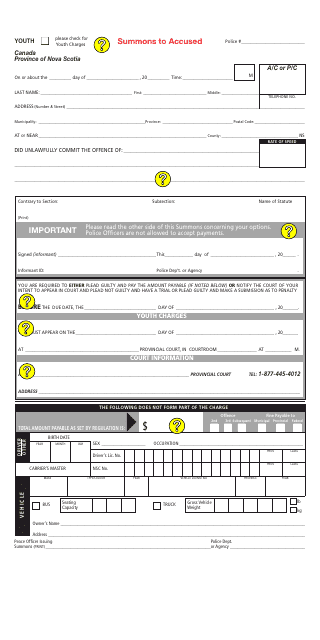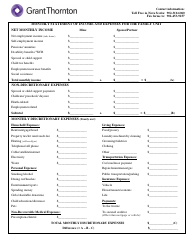Summons to Accused - Nova Scotia, Canada
A summons to the accused in Nova Scotia, Canada is a legal document that is issued to notify an individual that they have been formally charged with a criminal offense. This document requires the accused person to appear in court to answer to the charges made against them.
In Nova Scotia, Canada, the summons to the accused is usually filed by the court or law enforcement agencies.
FAQ
Q: What is a summons to accused?
A: A summons to accused is a legal document that requires an accused person to appear in court.
Q: Who issues summons to accused in Nova Scotia, Canada?
A: Summons to accused in Nova Scotia, Canada are issued by the police or the Crown prosecutor.
Q: What happens if someone fails to appear after receiving a summons?
A: If someone fails to appear after receiving a summons, a warrant for their arrest may be issued.
Q: How does someone receive a summons to accused?
A: A summons to accused is usually delivered in person by a police officer or a process server.
Q: Can someone refuse to comply with a summons?
A: Refusing to comply with a summons can result in additional legal consequences.
Q: What should someone do if they receive a summons?
A: If someone receives a summons, they should contact a lawyer for legal advice and guidance.
Q: Can a summons be challenged in court?
A: Yes, a summons can be challenged in court if there are valid reasons or legal arguments to do so.
Q: What information is usually included in a summons to accused?
A: A summons to accused typically includes the accused person's name, the date and time of the court appearance, and the charges they are facing.
Q: Is a summons the same as an arrest warrant?
A: No, a summons is different from an arrest warrant. A summons requires the accused person to appear in court, while an arrest warrant authorizes their arrest.
Q: Can a summons be withdrawn or cancelled?
A: Yes, a summons can be withdrawn or cancelled by the Crown prosecutor or the court under certain circumstances.
Q: What are the potential outcomes of a court appearance after receiving a summons?
A: The potential outcomes of a court appearance after receiving a summons include pleading guilty, pleading not guilty, or seeking legal representation.
Q: What happens if someone pleads guilty after receiving a summons?
A: If someone pleads guilty after receiving a summons, the court will proceed with sentencing.
Q: What happens if someone pleads not guilty after receiving a summons?
A: If someone pleads not guilty after receiving a summons, a trial will be scheduled to determine their innocence or guilt.
Q: What are the potential penalties for a conviction after receiving a summons?
A: The potential penalties for a conviction after receiving a summons depend on the nature of the charges and can range from fines to imprisonment.
Q: How long does it usually take for a court appearance after receiving a summons?
A: The time between receiving a summons and the court appearance can vary, but it is typically within a few weeks to a few months.
Q: Can someone represent themselves in court after receiving a summons?
A: Yes, someone can choose to represent themselves in court after receiving a summons, but it is recommended to seek legal representation for the best possible outcome.
Q: What should someone do if they have concerns about their summons or the legal process?
A: If someone has concerns about their summons or the legal process, they should consult with a lawyer who can provide guidance and assistance.


